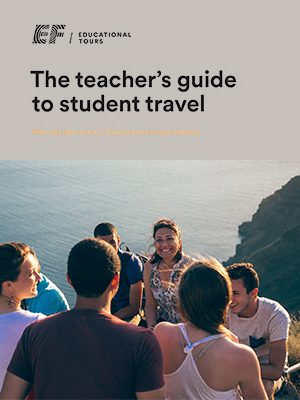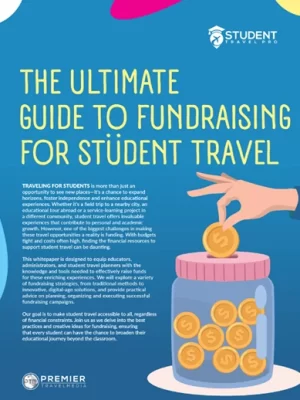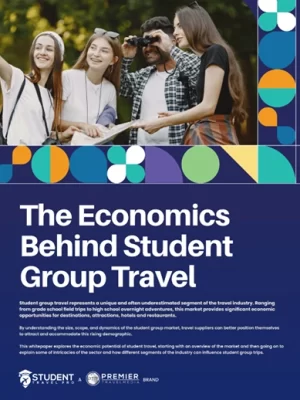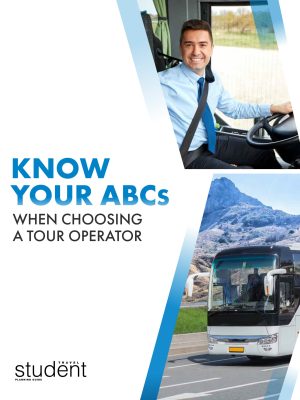Every student travel planner wants to craft the perfect itinerary. A common problem? Budget constraints. Here’s how to plan an economical, top-notch trip for students
Budget constraints are a practical reality—they present themselves at home, at work, in family endeavors and when out with friends. Student travel planners know first-hand the pain of budgeting for student trips and having an exceptional adventure mapped out only to realize that the funds aren’t available or that the beautiful hotel and guided tour aren’t feasible.
Fortunately, there are ways to overcome these budget constraints, transforming your frustration into a triumphant sense of accomplishment. This article equips you with the tools to successfully navigate budget constraints as you outline your student trip. What are some ways to save money? Are there resources for those who may lack the funds for student travel? These questions and more are answered below, empowering you to build a sparkling itinerary with frugality in mind.
A Preliminary Note: When Budgeting for Student Trips, Early is Key
The practical tips in this article become more straightforward—and costs become lower—when you start planning early. For instance, plane tickets are often cheaper when you book six months before departure rather than three weeks out. Budgeting for student trips early also leaves you more time to identify potential scholarships, grants and other sources of funding. This early planning not only saves money but also provides a comforting sense of security and peace of mind, reassuring you that you have everything under control.
 Follow a Budget
Follow a Budget
There is no way to manage budget constraints if you have no budget to follow. Thus, as you start assembling your trip components, you should create a written financial budget. You should specify the following components:
- Transportation
- Accommodations
- Meals
- Attraction admissions
- Tour guides
- Travel insurance
- All taxes, fees and gratuities
By creating and diligently monitoring a budget, you’ll not only feel responsible and in control of your finances but also ensure a smooth and stress-free planning process. This approach allows you to allocate funds wisely, ensuring that every aspect of your trip is accounted for.
Choose Your Student Destination Wisely
When budgeting for student trips, it’s worth considering less-explored locales versus big, expensive cities. You’ll often find unique experiences at a fraction of the cost of popular tourist destinations. Aside from aligning with educational goals and affordability, consider the following when choosing your field trip destination:
- Consider student interests: Survey students to understand their interests and preferences. Find a destination that aligns with their curiosities and passions.
- Evaluate safety and accessibility: Research the safety conditions, accessibility for students with disabilities and any potential risks or travel advisories for the destination.
- Assess logistical feasibility: Consider the distance, transportation options, accommodation availability and overall cost to ensure the trip is logistically feasible for your group.
- Explore cultural immersion opportunities: Look for destinations that offer opportunities for cultural exchange, interaction with local communities and exposure to diverse traditions and perspectives.
- Check for age-appropriate activities: Ensure the destination offers activities and experiences suitable for the age group and maturity level of your students.
- Consider educational partnerships: Explore opportunities to collaborate with local schools, universities or educational organizations at the destination for enriching experiences.
- Evaluate climate and seasonal factors: Consider the weather conditions and seasonal events that may impact your trip’s timing and activities.
- Seek input from colleagues and experts: Consult with other educators, travel professionals or local experts who have experience with potential destinations.
- Involve students in the planning process: Engage students in researching and evaluating potential destinations, fostering ownership and excitement for the trip.
Budgeting for Student Trips Includes Eating Like the Host Community
Mirroring your host destination in what you eat is an effective way to accomplish three objectives: saving money on dining out, immersing your group in the local culture and practicing sustainable travel.
Culinary customs should always be considered when embarking on a new adventure, so try to find budget-friendly meals that are authentic to the locale. Many destinations are happy to include student groups in their culinary culture. Some examples include:
 Arrange for a home-cooked meal with a local family: Many communities are open to hosting student groups for a traditional meal prepared in a local household. This allows students to experience authentic home-cooked dishes and observe local cooking techniques and customs.
Arrange for a home-cooked meal with a local family: Many communities are open to hosting student groups for a traditional meal prepared in a local household. This allows students to experience authentic home-cooked dishes and observe local cooking techniques and customs.- Visit local markets and street food vendors: Explore local markets and try street foods that are popular among the local community. This can include trying fresh produce, local delicacies, and traditional snacks.
- Participate in a cooking class or demonstration: Attend a cooking class or demonstration led by a local chef or culinary expert. Students can learn about the ingredients, cooking methods, and cultural significance of traditional dishes.
- Dine at locally-owned restaurants: Instead of chain restaurants, seek out small, family-owned eateries that serve authentic local cuisine. This supports local businesses and provides an opportunity to try dishes prepared by members of the community.
- Attend a food festival or cultural event: If the field trip coincides with a local food festival or cultural event, it can be an excellent opportunity to sample a wide variety of traditional foods and learn about their significance.
- Participate in a farm or food production visit: Visit a local farm or food production facility to learn about the agricultural practices and food production methods of the community.
- Engage with local culinary experts or food historians: Arrange for local culinary experts, chefs, or food historians to provide insights into the cultural and historical significance of the community’s cuisine.
The key is to seek out authentic experiences that allow students to immerse themselves in the local food culture, learn about traditional ingredients and cooking techniques, and engage with members of the host community.
Research Affordable Accommodation Options for Students
Another necessity when planning a student trip on a budget is keeping accommodation costs down. For this, you should negotiate with hotels for student group rates, which many hotels—even the most prominent chains—offer. For such negotiations, be prepared to provide the hotel with the approximate number of sleeping rooms needed and ascertain if there are certain times when rates are lowest. Hotels have policies geared towards groups; for example, hotels generally offer one free room for a given number of reservations, typically 15-25.
Negotiating with hotels directly can be challenging for an inexperienced planner, so look to online hotel booking services like Hotel Planner and Groups 360.
Also, look for hotels with breakfast included—this saves money and is more convenient than taking your group out for breakfast, which cuts into valuable itinerary time.
It’s important to realize that the most memorable journeys can be budget-friendly and affordable if you consider the steps above. Start early, make and monitor a budget, and carefully research which destinations boast the best options for affordable lodging, food and grade-appropriate fun learning experiences.
By Billy Stampfl, Contributing Writer
Images courtesy of Freepik.com









